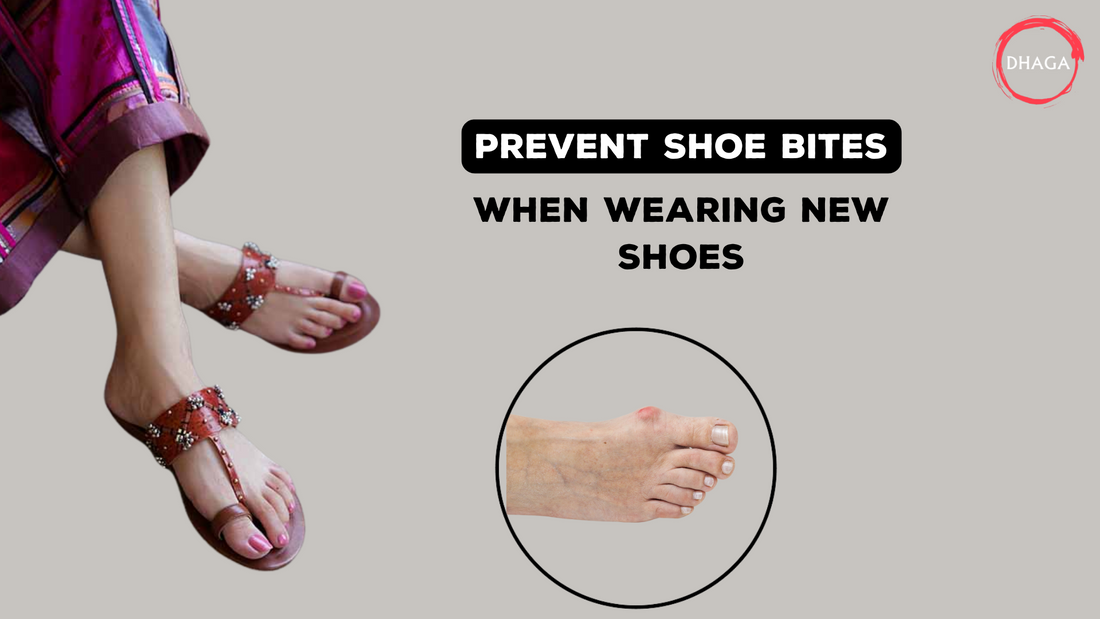We've all been there: excited about a brand-new pair of shoes or sandals, only to have them cause painful blisters or sore spots after the first wear. Yes, we're talking about the dreaded shoe bite. New footwear, whether gorgeous flats, sliders, heels, or office shoes, often leads to discomfort on your ankle, toes, or heel.
Shoe bite protection are more common than you think, especially among women who wear closed shoes, stiff sandals, or even stylish flats. But don't worry, there are simple, everyday tips that can save your feet from the pain. This article will help you understand what causes shoe bites, how to prevent them, and what kind of footwear can keep your feet comfortable.
What is Shoe Bite?

A shoe bite is a type of friction injury that happens when your new (or even old) shoes rub repeatedly against the skin of your feet, causing redness, irritation, swelling, or even cuts and blisters. It usually affects areas like:
-
The ankle bones
-
The top of your foot
-
The back of your heel
-
The sides of your toes
Shoe bites are painful and can leave dark marks or scars if not treated. You know how annoying they can be if you've ever walked with a bandage on your ankle or limped through a wedding function.
Also Read - The Modern Woman’s Guide to Stylish and Functional Footwear
Why Do Shoe Bites Happen?
Here are a few common reasons:
-
Tight-fitting shoes that don't allow enough space for your foot
-
Hard shoe material like synthetic leather or stiff plastic
-
No socks or improper socks that don't provide a buffer
-
Improper foot size (buying a size too small or too big)
-
New shoes that haven't yet adapted to your feet
How to Prevent Shoe Bites on Ankle (and Other Areas)
You don't need to suffer for the sake of fashion. Here are some simple tips for shoe bite protection, especially when wearing new sandals or shoes:
-
Break in Your Shoes Slowly: Don't wear new shoes for an entire day right away. Start by wearing them at home for short intervals, maybe 15–30 minutes, to help them mold to your foot shape.
-
Apply Petroleum Jelly or Moisturiser: Rub a little petroleum jelly, coconut oil, or a foot cream on the areas likely to get rubbed, like your heels or ankles. It reduces friction and moisturises your skin, making it less prone to injury.
-
Use Socks or Footliners: If you're wearing closed shoes, pair them with ankle socks or invisible foot liners. These act as a soft barrier between your skin and the shoe surface. Consider padded anti-bite heel stickers or gel pads for sandals or women's slidders.
-
Try the Blister Prevention Tape/Hacks: Before stepping out, use moleskine tape, band-aids, or blister pads on the high-friction zones. These can be lifesavers during weddings or long walking days.
-
Soften the Shoe Edges: If the back of your shoe or sandal strap is too stiff, gently bend it or rub it with a candle, moisturizer, or oil. You can use a hairdryer to slightly warm the shoe and then wear thick socks to stretch the area.
Shoe Bite Protection for Already Affected Skin

If you already have a shoe bite or blister:
-
Cover with a soft bandage
-
Clean the area with mild soap and water
-
Avoid wearing the same shoe until healed
-
Apply an antiseptic cream or aloe vera gel
-
Apply turmeric paste or coconut oil for natural healing at night
Home Remedies That Actually Work
-
Coconut oil + Camphor: Mix and apply to soothe the burn
-
Ice cube massage: Helps with swelling and pain
-
Ghee: Excellent desi remedy to reduce scarring
-
Aloe Vera gel: Heals and cools the skin fast
Should You See a Doctor for a Shoe Bite?
In most cases, shoe bites heal unaided within 3–5 days. However, if the area becomes swollen, filled with pus, or too painful to walk on, you should see a doctor. An infected blister or wound can be dangerous if not treated.
Also Read - Traditional Footwear for Women: Heritage Meets Fashion
Best Footwear Choices for Preventing Shoe Bite

Here's a quick guide to footwear for women that is more shoe-bite friendly:
-
Footwear for Women Flats: Choose soft, flexible flats with cushioned insoles. Avoid rigid straps or too much toe grip if you're prone to bites.
-
Womens Slidders: Sliders with padded upper straps, foam soles, and smooth edges are a great choice for daily wear, especially at home or for short walks. Look for sliders with fabric or soft PU interiors.
-
Office/Formal Shoes: Choose shoes with rounded toes and low-cut ankle backs. Opt for brands that offer "wide-fit" options or memory foam insoles.
Final Thoughts: Your Feet Deserve Comfort
A shoe bite may seem small, but it can ruin your day or outfit plans. The key is to prioritize comfort along with style. Always buy shoes that fit well; if you're unsure, choose the next size up and wear them with socks or padding. Proper footwear and foot care are essential, especially in India's hot and humid weather. Be kind to your feet, they carry your entire world every day!
FAQs
1. What causes a shoe bite on the ankle?
Answer: A shoe bite on the ankle is caused by stiff or tight shoes rubbing repeatedly against your skin. It usually happens with new shoes that haven't yet been adjusted to your feet.
2. How can I quickly heal a shoe bite?
Answer: Clean the area, apply an antiseptic or aloe vera gel, and cover with a bandage. Avoid wearing the same shoes until the wound heals. Home remedies like coconut oil or ghee also help in quickly recovering from a shoe bite.
3. Can I prevent a shoe bite while wearing sliders?
Answer: Yes, choose sliders with padded straps and soft materials. Apply petroleum jelly to your feet or use anti-bite stickers inside the sliders.
4. Do certain shoe materials cause more bites?
Answer: Yes, hard leather, synthetic materials, and poorly stitched interiors can cause more friction and lead to shoe bites. Look for soft, breathable materials.
5. Are flats better than heels for preventing shoe bites?
Answer: Generally, yes. Flats offer better balance and less pressure on the back of your foot; however, the material and fitting matter more than the style.



